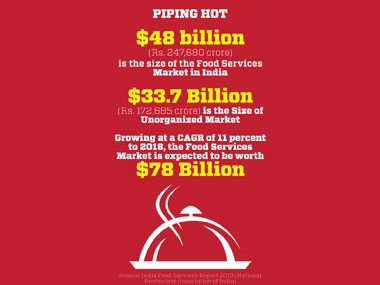In October last year, 25-year-old Karan Singh rented a stall at a food festival in Delhi to test his nouveau business plan of selling home-cooked food. Much to his surprise, his pilot was a resounding success.
“Around 1,000 people bought our food and we earned Rs 75,000 proving home cooked food is a sell-out idea,” recalls a proud Singh. The enthusiasm of that day has slow cooked itself into Langhar, a community marketplace that enables housewives, hobbyists and professionalcooks to commercialize their talent and passion for cooking, online.
Launched in February 2013, the Delhi-based portal-backed by Times Internet incubator TLabs-won $1,50,000 (Rs 90 lakh) at The Ark Challenge in September 2013, among three other startups from India. The Ark is a US-based accelerator program for technology startups.
TLabs, which typically invests in early-stage companies, put in another $20,000 (Rs 12 lakh) under its incubation program in February this year. “The first thing we noticed about their model was that it was disruptive and we thought it could become large in sometime,” saysAbhishek Gupta, Business Head, TLabs.
Langhar’s concept was borrowed from Singh’s mother who cooked and sold biryani, paratha and sarson da saag in their locality. Her business was a hit and many other ladies had followed suit.
Singh says, “It struck me that there is a market where housewives who have free time could cook and sell homemade food to people who yearn for it, like students and young professionals.”
Home chef hunt
After getting the early backing of TLabs, Singh and his team of three co-founders -Pankaj Sharma, 26, Sunil Kumar, 26 and Pawan Saini, 25 - partnered with celebrity chef Nita Mehta to judge a cooking competition to choose top home chefs who could make and deliver food for Langhar.
Singh says they wanted to partner with homemakers who had experience in the food catering sector and their own tried and tested recipes.“Nita was given the responsibility of handling the nitty-gritty of food quality and tasting,” says Singh.
Saini, who ran a food catering business in 2007, was to handle operations. He says, “Out of 2,000 cooks who filled our online application form, we shortlisted 140. We selected 50 from them and they are our partner chefs now.”
The ingredients, kitchen and cooking equipment are arranged by the cooks who get 75 percent of each sale. The remaining 25 percent is kept by Langhar. Chefs have to handle deliveries too.
Deepti Ahuja, who is in her late 20s, has been working as a chef with Langhar for six months and says she delivers food worth Rs 8,000 to Rs 10,000 a month. “We get the delivery charge reimbursed from Langhar. The dishes are assigned to us according to our specialty, which was tested in the chef competition.
If someone is good in Chinese, they don’t sell any other cuisine. We get basic recipes from Nita to ensure that food tastes the same every time we cook,” says Ahuja.
A few bugs
As of now, orders need to be placed one day in advance. Singh says they are working on bringing this notice period down to six-eight hours.“Even that is not good enough for people who are used to getting food delivered within an hour,” says Singh.
Food bloggers and experts notice a few problems with the model with respect to standardization of food and delivery. Sidharth Khullar, blogger, chef, Founder and Editor at Chef-At-Large, a food-centric website says, “At the very high level, it’s a great idea if they can work out the logistics. But, if you are talking about housewives and hobbyists-basically amateurs, their degree of hygiene will depend on their own past experience and whatever rules they have at their own home. So there is a small concern there.”
Khullar feels that standardizing this process will help them position themselves better in the space. “They will have to work in getting the delivery right. When they expandto other areas, the challenges will be greater,” notes Gupta of TLabs.
Same source
Singh says that the investment from Ark Challenge will be used to create a standard process so every aspect of business is controlled by Langhar. “The Ark experience was useful as welearned the importance of streamlining the delivery system and taking charge of it,” he shares. The startup is likely to partner with a home delivery company soon to get this going in a couple of months.
Like logistics, centralized sourcing of all ingredients for quality control is on the cards too. It has initiated this in a small way with the launch of a new segment - home-made chocolates in a gift box for Diwali costing Rs 499 each. Singh tells us that they’ve sold over 2,500 boxes since October 2013. “Standardization of ingredients was implemented in making these chocolates,” adds Singh.
Currently operational only in Delhi and parts of the National Capital Region, Langhar earns revenues of Rs 3 lakh a month. It plans to gradually expand to other cities over the next six months.
This article first appeared in Entrepreneur India magazine.


)
)
)
)
)
)
)
)
)



